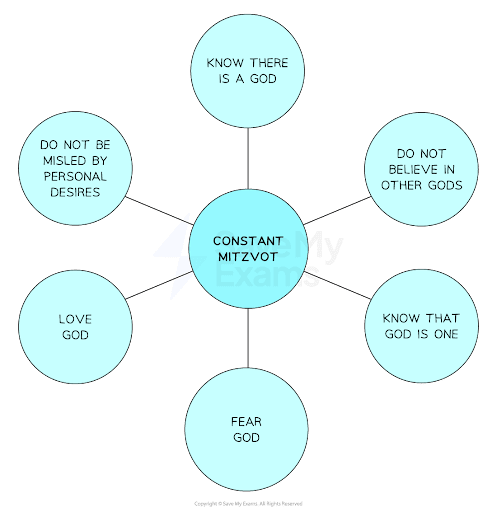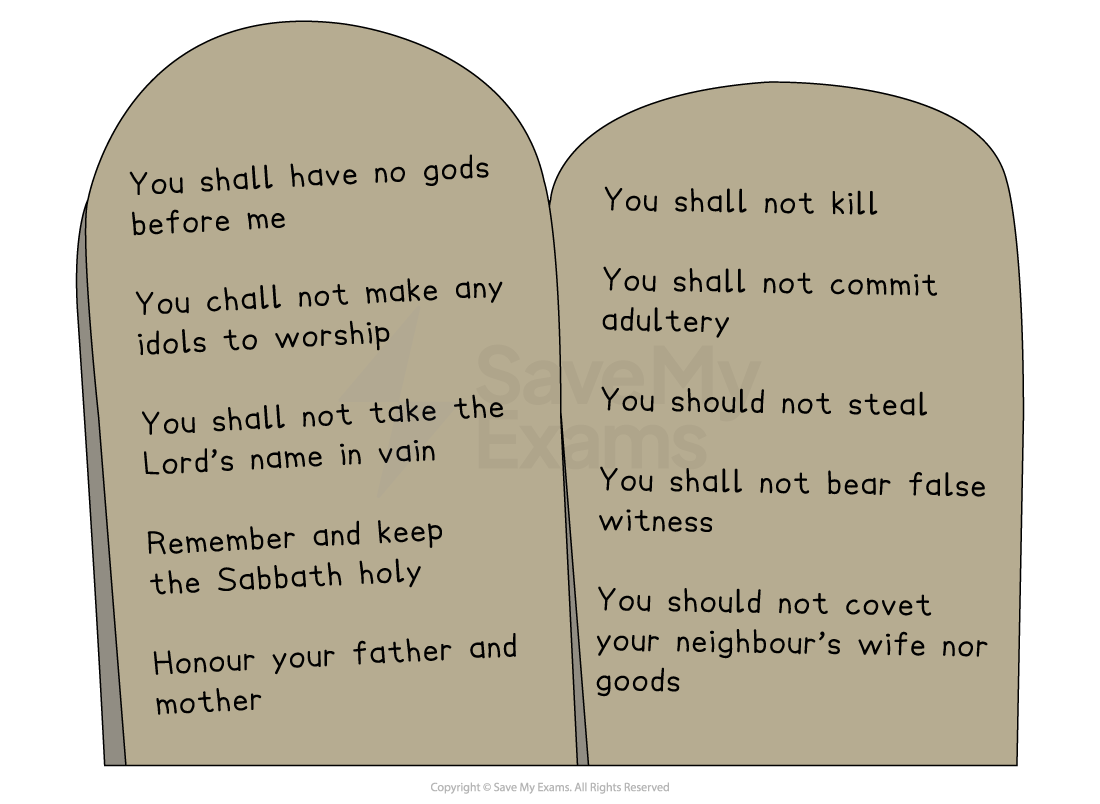Judaism & the Covenant (WJEC Eduqas GCSE Religious Studies): Revision Note
Exam code: C120
The meaning & significance of the Abrahamic Covenant
What is a covenant?
A covenant is an agreement between two or more people
It can be thought of as a deal in which both sides have responsibilities or duties that must be upheld if the covenant is to be considered binding
In religion, a covenant is a commitment of love, and it creates a relationship that is different from that of a contract
Covenants in Judaism can only be established and sealed by an oath
The oath is so important in a covenant that the word "oath" is sometimes used instead of the word covenant
The covenant with God is described as "an everlasting covenant" (Brit Olam)
It is the belief that God will never break his covenant with the Jewish people
The covenant means that Jews believe they have a special relationship with God and a relationship with each other
This relationship with God contributes to the Jewish identity and encourages them to examine who they are in relation to God
It means that everyone in the community is a member of the covenant and important to God, and therefore, all Jews should be important to each other
The covenant also helps Jews to focus on their obligation to live as tradition teaches and the way God wants people to live: generously, compassionately and with concern for justice and the welfare of others
What is the covenant of circumcision with Abraham?
For Jews, Abraham is known as the founder or first patriarch of Judaism, and Jewish people try hard to follow his example
Abraham was the Jewish prophet who received the first covenant from God and took God’s message to the people
It was through Abraham that the idea of the Promised Land, a homeland for Jewish people, was created
There are three main parts of the covenant between God and Abraham
God called Abraham and his family to the new land of Canaan, often referred to as the Promised Land
God promised Abraham that he would make a great nation for him
God promised to bless Abraham and his family
The story of God giving Abraham the covenant is important in Judaism
Abraham was born in the city of Ur (located in the country now called Iraq) at a time when worshipping idols was common
The Book of Genesis explains how God spoke to Abraham in a vision
“Go forth from your native land and from your father’s house to the land that I will show you. I will make of you a great nation, and I will bless you” (Genesis 12:1–2)
God instructed Abraham to leave his home and travel to Canaan, the Promised Land, which is now known as Israel
God asked Abraham to follow his rules and be a good example to others
In return, God promised to give Abraham and his wife, Sarah, the child they both longed for and to name their descendants as his chosen people
Abraham agreed that he and his descendants would obey and worship God and lead by example
“Go forth from your native land and from your father’s house to the land that I will show you. I will make of you a great nation, and I will bless you” (Genesis 12:1–2)
As part of the covenant, God commanded that the covenant be sealed through Abraham’s circumcision
“[Circumcision] shall be the mark of the covenant between Me and you… Throughout all generations, every male shall be circumcised when he is eight days old… The uncircumcised male… shall have his soul cut off from his people; he has broken My covenant” (Genesis 17:11–14)
Abraham kept this covenant, and his wife, Sarah, gave birth to their son, Isaac
God chose Isaac to inherit the covenant directly from his father, and Isaac handed it on to his own son, Jacob
Therefore, Abraham, Isaac and Jacob are known as Israel’s patriarchs
As a sign of this continuing covenant, Jewish people perform the rite of circumcision of male babies eight days after they are born, in a ceremony called Brit Milah
What are the mitzvot?
The Torah as a revelation from God
The Torah is believed to be the Word of God directly revealed to Moses by God on Mount Sinai
Moses is regarded as the greatest prophet in Judaism
Jews believe that he also made an important covenant with God
It is believed that Moses is the only person to have ever witnessed God face-to-face
Moses delivered the words of God and received miracles sent by God
Jews believe that God acted through Moses
The Torah contains God’s laws, teachings and instructions for life
For most Jews, these are viewed as divine and perfect
The significance of the Torah means that it is central to Jewish life
It guides moral decisions, religious practices and daily behaviour
It is the source of the 613 mitzvot (commandments)
It is studied regularly in yeshivot (Jewish schools) and synagogues
The Torah is also the foundation of worship within Judaism
It is read publicly in synagogue services, especially on Shabbat and festivals
It is treated with great respect, handwritten on scrolls, kept in the Ark and never touched directly
The Torah is also responsible for uniting the Jewish Community
Shared beliefs and values from the Torah connect Jews worldwide
This is celebrated during Simchat Torah, when the annual reading cycle ends and begins again
What are the mitzvot?
Jewish people believe they have a special responsibility to follow God’s laws or commandments (called mitzvot in Hebrew), because of the covenants they have made with him
Maimonides, an influential rabbi, compiled a list of the 613 mitzvot
He wanted to provide a summary of Jewish law
This list is in the Sefer Madda or Book of Knowledge, which is found within the Mishneh Torah
The Sefer Madda explains that the foundation of everything is God, and therefore, moral principles should also originate from God
The Torah contains 613 laws, and these are the mitzvot
There are 248 positive mitzvot, which explain what Jews should do. These rules are known as mitzvot aseh
There are 365 negative mitzvot, which explain what Jews should not do. These rules are known as mitzvot ta’aseh
Alternatively, the mitzvot can be divided according to their purpose
Ritual mitzvot explain what Jews should or should not do to avoid offending God and cover areas such as worship and festivals
These mitzvot form a personal covenant between a Jewish person and God
The first four of the Ten Commandments are the most important of the ritual mitzvot
Moral mitzvot explain how Jews should act when dealing with other people
They help Jews to live as a community in a way that God finds acceptable
The Ten Commandments are important mitzvot as they are the basis for moral behaviour
Some laws are judgments from God, for example, "you shall not steal"
These are known as mishpatim
There are also six constant mitzvot. These are rules or laws that should always be in the minds of Jews

There are also other mitzvot within the Talmud
The mitzvot attempt to prevent the bond between humans and God from being damaged
What is the difference between Orthodox and Reform Jewish beliefs?
Orthodox Jews uphold every area of the mitzvot because they believe all Jewish laws are important and should be followed
They believe this because:
The Torah is the word of God and should be taken literally
God’s law must be obeyed, as he is the creator of all life
Some laws cannot be obeyed as they refer to the Temple, which no longer exists
God will judge them on how well they follow his law, and Jews will be rewarded or punished accordingly
Reform Jews believe that the ritual side of Judaism can seem a bit outdated and that many of the rules are not compatible with modern life, so they focus on rules that seem more relevant
They believe this because:
Things change over time, and we live in the modern world, so religious rules should be adapted
Mitzvot are a good guide to living, but no one can keep to them all
Some of the rules are symbolic and should not be taken literally
Why are the Mitzvot important?
They form the basis of the Halakhah, which is the code of conduct for Jewish life
How Jewish people conduct their lives will impact what happens after death
Jews believe that, by following the mitzvot, they will live a good life, meaning that they will be closer to God
Some Jews believe this will also help them to be judged well in the afterlife and achieve a place in Gan Eden
The importance of the Ten Commandments
What is the Covenant at Sinai?
Jews believe that:
After Moses had led the Israelites (children of Israel) out of Egypt, he took them through the desert, and then he disappeared up a mountain (Mount Sinai)
This is when God revealed to Moses the 613 commandments that Jews are expected to follow, including the Ten Commandments
God spoke to Moses through a burning bush
Many Jews (mainly Orthodox Jews) also believe that Moses was given the oral Torah, which was passed down by word of mouth to help people interpret the written Torah

Moses was given the Ten Commandments to teach the children of Israel about the most important rules to live by
Moses formed a covenant with God that, as God’s chosen people, the Israelites would keep the commandments
Why are the Ten Commandments important within Judaism?
The Ten Commandments are significant within Jewish belief and practice for many reasons
They were given by God to Moses and form the foundation of the agreement (covenant) between God and the Jewish people
They are part of the Torah and include both religious duties (e.g. worship only God) and moral duties (e.g. respect your parents and do not steal)
By following the commandments, Jews demonstrate obedience and loyalty to God as the lawgiver
They help Jews understand how to live a holy and ethical life, shaping both personal and community values
The principles underpin the wider system of commandments (613 mitzvot) followed in Judaism
Keeping the commandments maintains the covenant and shows respect for God’s authority
They have shaped legal and moral ideas in Jewish communities and beyond, emphasising justice and responsibility
Worked Example
Give two ways in which covenants are important in Judaism.
[2 marks]
Answer:
Covenants show the special relationship between God and the Jewish people. [1 mark]
They give Jews laws and responsibilities, such as keeping the mitzvot. [1 mark]
Examiner Tips and Tricks
Remember that examiners want clear distinctions between the covenants.
Abrahamic Covenant — land, nation, descendants and circumcision
Mosaic Covenant — Torah, Ten Commandments and law-keeping
Tip: Always name the covenant when answering.
Use keywords to impress.
Try to include at least one or two of the following.
Covenant (agreement)
Mitzvot (commandments)
Monotheism
Shema
Circumcision / Brit Milah
Law-giver / judge
Chosen people
These boost accuracy and marks.
Try to link beliefs to Jewish life today.
Markers want impact.
Jews keep Shabbat, follow kosher laws and perform circumcision due to covenants
Strengthens identity as God’s chosen people
Encourages obedience and responsibility
Include “so what does this mean for Jews now?” to score higher.

Unlock more, it's free!
Was this revision note helpful?
